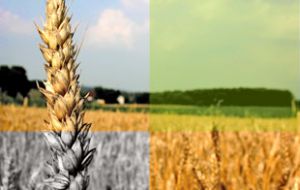MercoPress. South Atlantic News Agency
EU plans to increase grain crop by cutting on fallow land

The European Commission proposed this week to suspend for a year rules forcing grain farmers to leave a percentage of fallow land and thus helping to curb soaring prices of cereals such as wheat.
"The Commission has cut the rate of compulsory set-aside to zero percent for grain planted either now, in autumn or next spring, in other words for next year's harvest," said farm spokesman Michael Mann. In an effort to control overproduction, EU farmers have been obliged since 1992 to leave 10% of their land fallow. Brussels estimates that dropping the rule could add an extra 1.6 to 2.9 million hectares farm land and possibly increase crop production by 4%. "There's no overproduction any longer; we're facing a shortage of grain so we have decided that the 10% rule should be cut for one year" said Mann adding that this will help the current situation by possibly adding as much "as 10 million tons to European grain production next year". EU farm ministers are expected to endorse the decision late this month. "A poor 2008 harvest combined with 10% set-aside would expose the internal market to potentially serious risk," said EU Agriculture commissioner, Mariann Fischer Boel. Ms Fischer Boel has said previously that she feels the set-aside policy is an "anachronism". She is expected to recommend its total abolition in a reform paper due in November. However environmental groups argue that the abolition of set-aside could leave millions of farm birds without enough food and breeding site. BirdLife International immediately raised the alarm: "set-aside land provides an important refuge for wildlife in areas of intensive agriculture". The conservation group said larks and pewits use set-aside land for nesting, while yellowhammers and buntings rely on it for food. In France, the land is also a vital habitat for the little bustard which is considered endangered specie.




Top Comments
Disclaimer & comment rulesCommenting for this story is now closed.
If you have a Facebook account, become a fan and comment on our Facebook Page!